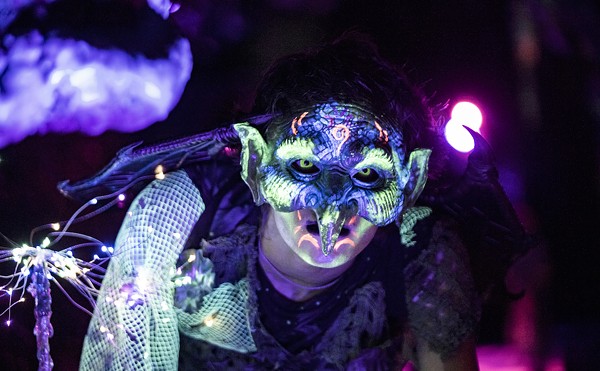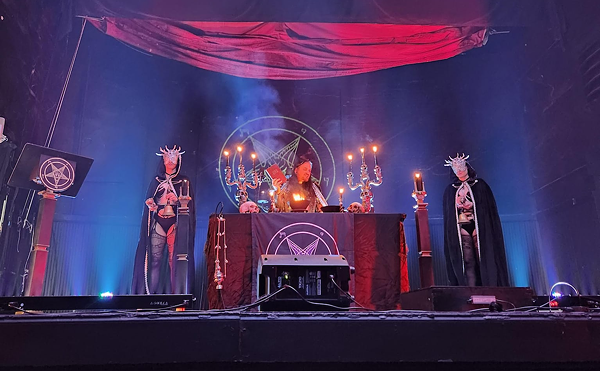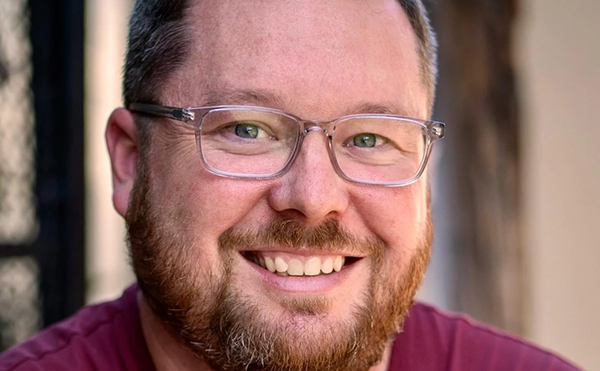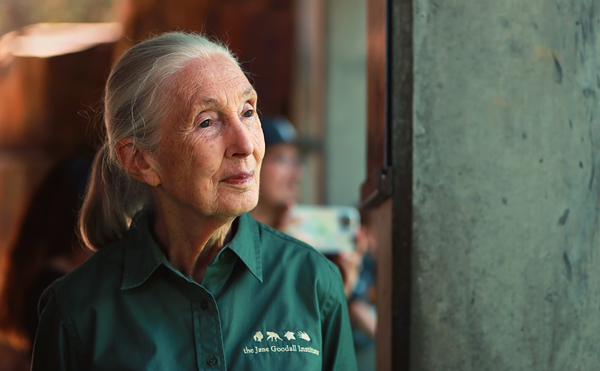
To say that the Pulitzer-Prize winning show is the most impactful and thrilling musical of this century is not an exaggeration—and that includes the much-lauded and deservingly beloved, “Hamilton.” However, even though it begins as “just another day,” it’s not an easy journey.
We follow the “perfect, loving” Goodman family’s attempts to survive. The sexy and sharp mother Diana (Alexis Carra-Girbés) is a delusional bipolar depressive. Her two talented teen children, Gabe (Ben Sutherland) and Natalie (Mariela Zeno) are just hanging on. Gabe is a dashing, playful but complicated presence. The younger Natalie strives for perfection trying to emerge from her brother’s shadow—and it’s not going well. Their father, Dan (Jim Sorensen), is constant and genuine but increasingly tired as Diana’s doctors (both played by Nicholas Perez-Hoop) throw every possible therapy against the wall hoping something will stick. The pressure of it all drives daughter Natalie to take a fork in the road diverging from the rigid “crystalline clear” world of Mozart to slacker-philosopher boyfriend Henry’s (Max Dalton) escape into the improvisation of jazz and drugs.
The story urgently rushes forward, driven by Tom Kitt and Brian Yorkey’s sophisticated Tony-winning, rock-inflected score that’s deceptively infectious. The melodies sweep you away and Mr. Yorkey’s pithy and insightful lyrics drive home the conundrum that mental illness poses within a family:
Who’s crazy—the one who can’t cope,We as the audience are sucked immediately into a swirling, emotional vortex that’s really akin to a bullfight worthy of Ernest Hemingway. Our emotions are like a charging bull that can’t escape the thrusts of the picador. Every forward movement brings the sting of pain.
Or maybe the one who’ll still hope?
The one who sees doctors
Or the one who just waits in the car?
Musical director, Juan Rodriguez, has whipped his crackerjack musicians into a fine-tuned ensemble. Michael Starobin’s Tony-winning orchestrations sound wonderful, alternating electric guitar riffs with soulful support on violin and cello. The score reflects each character’s individual musicality, perfectly expressing their emotional state. For me, the sound reinforcement that modern audiences seem to demand, muddies more lyrics than I’d like in the intimate black box; I would’ve loved to hear this full-voiced cast with less amplification.
The designers’ splendid work contributes to creating a cohesive whole. Chis Pyfrom’s two-tiered set uses the University of South Florida’s black box fully—complete with a spiral stair. This enables director Emilia Sargent to keep the action moving, shaping focus, while also giving characters the ability to observe and sing from multiple perspectives on high. The modern costumes by last year’s Theatre Tampa Bay Award-winner, Meli Mossey, are spot on and reflect the characters’ different emotional states. And Keith Eisenstadt’s multi-textured lighting also uses intense saturated colors worthy of the psychic chaos that swirls around the action.
The six-member company is uniformly strong; each is at the top of their game both vocally and dramatically. Ms. Carra-Girbés (who is also the choreographer) has her Broadway pedigree on full display. In one of the great women's roles in recent memory, her vocal and emotional range is immense and always perfectly calibrated. One of the great joys of the intimate space is that the close proximity to the audience allows for great nuance that would be lost on most other stages. A prime example is the two sides of Diana’s “rock star” doctor; Perez-Hoop brings his devilish charm back to town and shines in the role. The petite Ms. Zeno is a ball of fire displaying vocal prowess and dramatic heft and contrasts nicely with the sweetness Mr. Dalton brings to the stoner, Henry. Ben Sutherland’s Gabe surpasses even his noteworthy turn in last year’s Trailer Park musical. Anchoring the ensemble as Diana’s “boring” husband, Jim Sorensen brings some of his finest acting to the smaller, subtle moments at the denouement when the pain in his eyes will break your heart.
Kudos to artistic director/producer Sargent for finally bringing this show to the stage. Her expressed love for the material shows in every aspect of the production. It’s an important show that demands to be seen—unflinching is its depictions and eliciting tears on multiple occasions. I saw the original in D.C and two different Broadway casts as well as local productions in Orlando and twice in Sarasota. Still, when it honestly and musically soars, as it does here, the gut punches still land with force and dry eyes are simply just not possible.
In a recent interview, Maria Friedman, the beloved British stage actress and director (who will inevitably lead her breathtaking Broadway revival of “Merrily We Roll Along” to a slew of Tony awards on June 16) confesses that all she’s interested in is “Detailed storytelling and examining why LOVE is so hard and so essential.”
Indeed, LOVE is at the heart of what makes all our lives meaningful. And even though Diana’s Dr. Madden counsels that “the price of love is loss,” we’re left teary-eyed but buoyed by the power of the human spirit to survive. It’s not betraying the drama to reveal that a glorious, inspiring chorus ultimately fills the theater and our hearts with elation. If we just “find the will to find our way . . . there will be light.”
Tickets to see Next to Normal at the University of South Florida's Tampa campus on select nights through June 16 are still available and start at $24.
Subscribe to Creative Loafing newsletters.
Follow us: Google News | NewsBreak | Reddit | Instagram | Facebook | Twitter

















